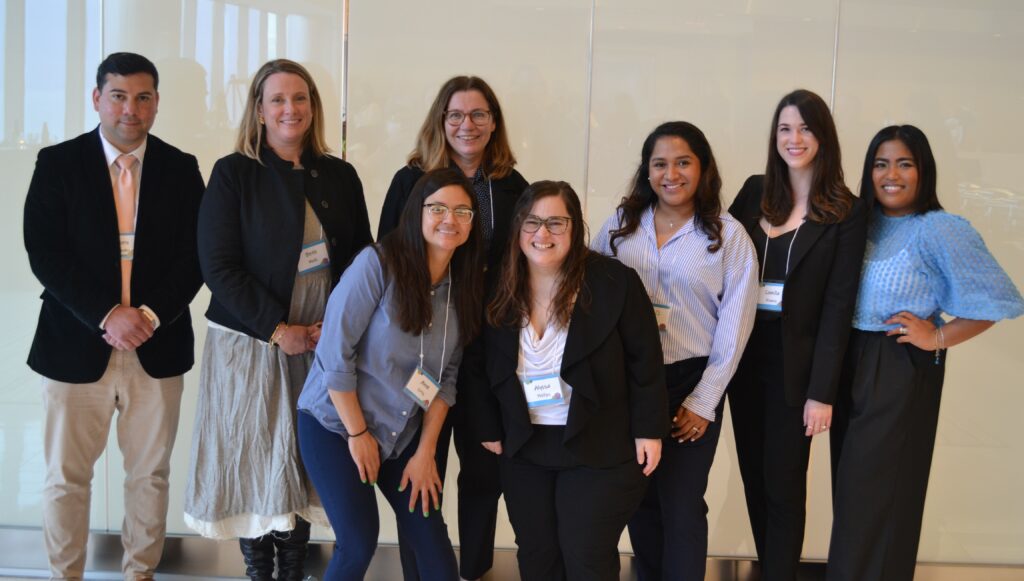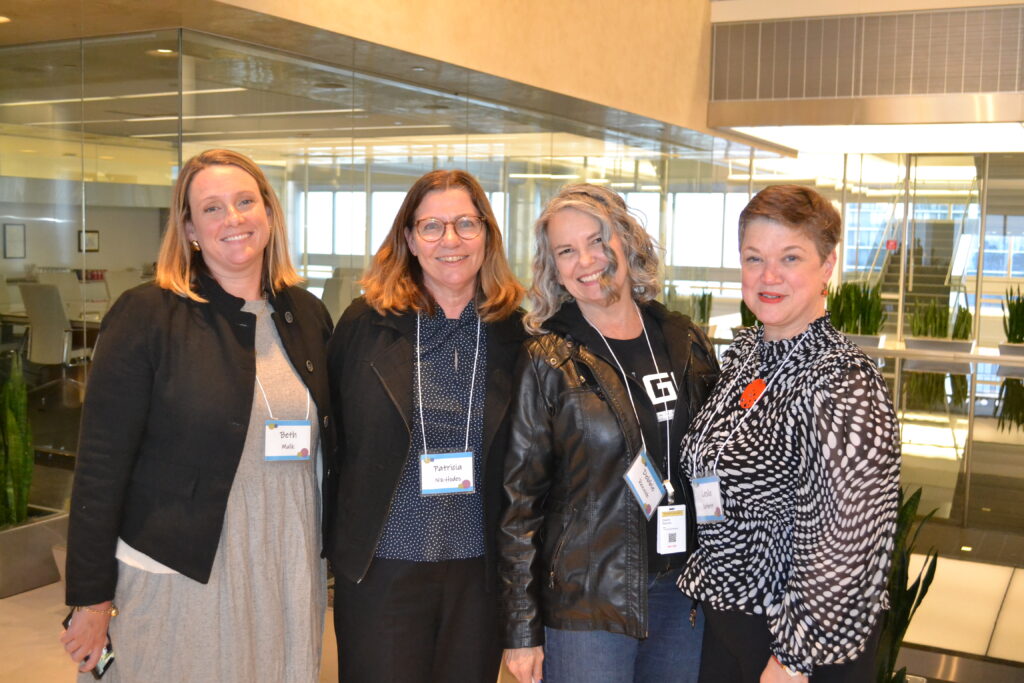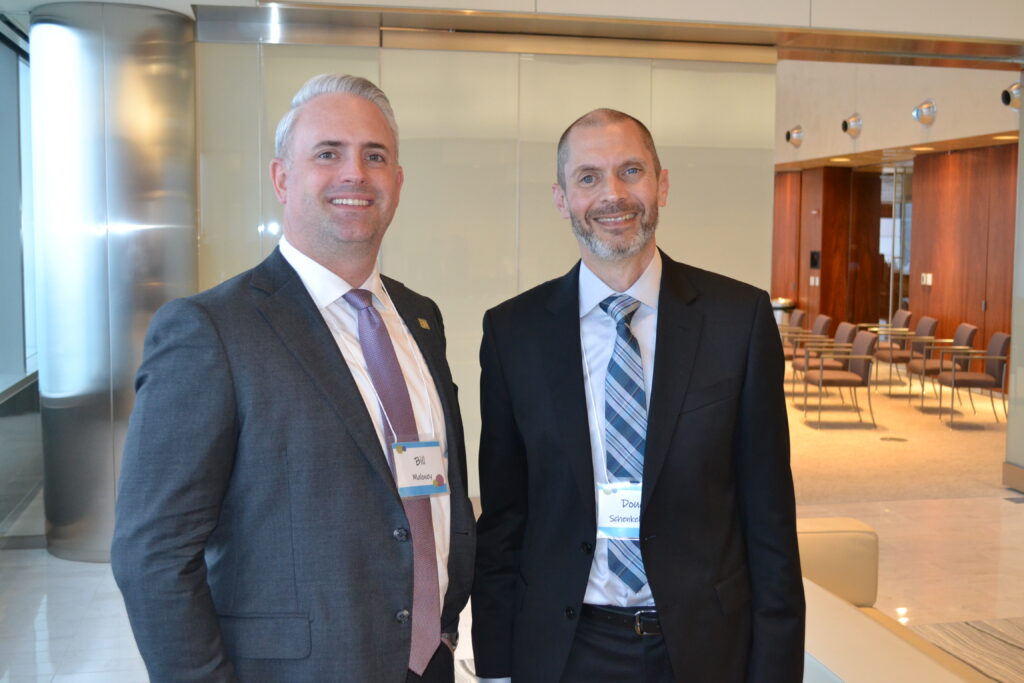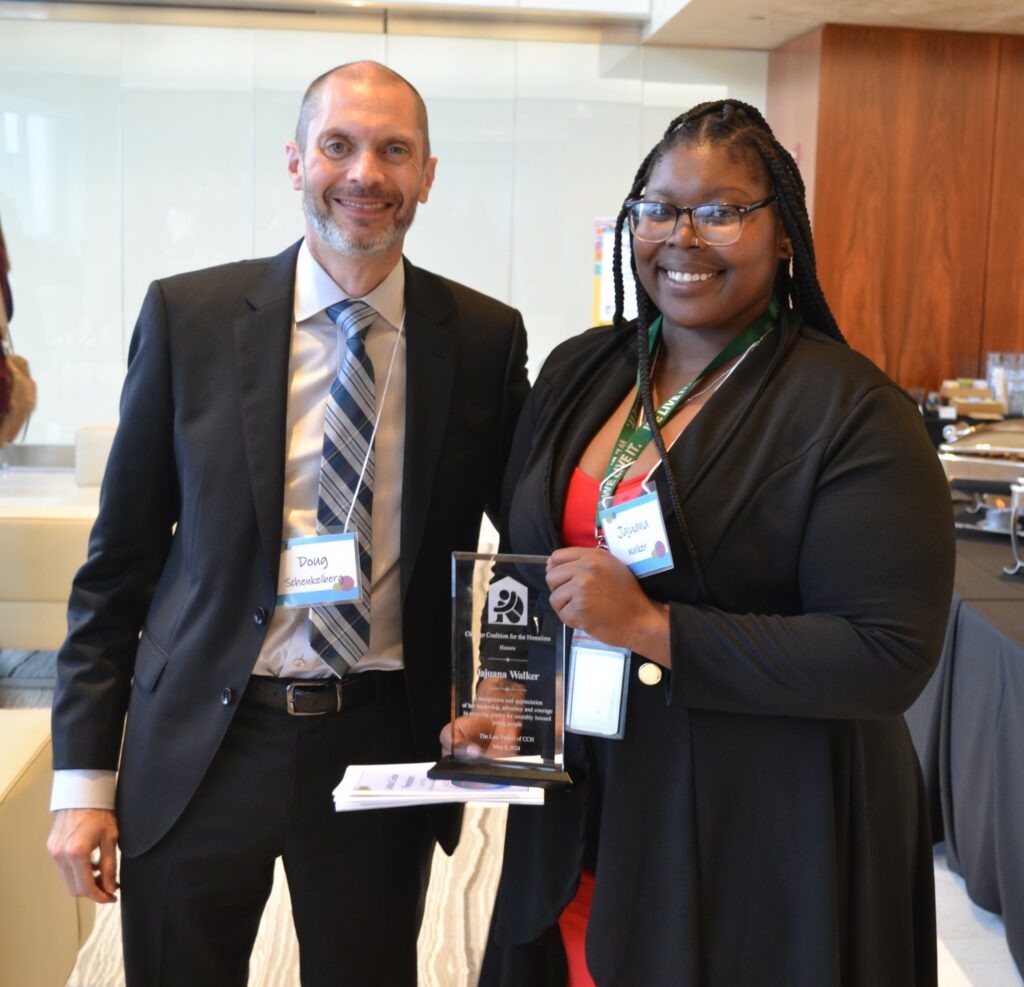“Just because the Supreme Court has overturned this order doesn’t mean cities should just go into a mode of being reactionary and criminalizing people for biological necessities,” she said. “Particularly in Chicago and Illinois, I think there is a recognition that criminalization is not effective. A housing first approach is effective and that seems to be the direction that people here want to move.”
Patricia Nix-Hodes, director of CCH’s The Law Project.
Chicago Tribune: In Chicago’s tent cities, ‘a multitude of challenges’ to address the city’s rising homelessness

Two women, who asked not to be named, tend to a kitten dropped off at their tent encampment at a rail underpass in the 3000 block of West Chicago Avenue on June 25, 2024, in Chicago. (John J. Kim/Chicago Tribune)
Robert Bulanon glanced at the sky and frowned at the rain. He hurried into his home and emerged, holding an umbrella over his head, picking his way between a barbershop pole, a pair of bus seats, a wheelbarrow, a grill where another man was cooking beef stew, and other objects scattered along the embankment of the canal.
Bulanon, 52, is one of about 20 people who live in a set of makeshift shelters along the North Shore Channel between Foster and Bryn Mawr avenues on Chicago’s Northwest Side. A ladder leaned against the chain link fence, separating the river embankment from athletic fields at Northside College Prep, a selective enrollment high school.
By July 30, the residents will no longer be able to call the longtime encampment home. The next day, city departments are scheduled to begin clearing the tents and items, officials said, offering the group non-congregate shelter placement at a downtown hotel. Notices will go up starting the first week of July. The idea of relocating them has been talked about for years.
“They said, ‘We’re here to help; we could send you somewhere, a shelter or something,’” Bulanon recalled of his first interaction with the city.
Months after voters rejected the Bring Chicago Home referendum, which sought to raise millions for homelessness services by raising the city’s real estate transfer tax for property sales above $1 million, Chicago is at a critical juncture on how to address its rapidly growing homeless population.
The city has historically prioritized finding housing for its homeless, many of whom reside in tent cities across its parks and under bridges. But with low affordable housing stock, depleted federal and state funding and other challenges, the city’s number of homeless is outpacing what the city can provide.
The Return of the Justice Circle
By Michael Nameche, Director of Development
On May 9, supporters and allies of CCH’s Law Project gathered for the Justice Circle reception at the law offices of Baker McKenzie. The event celebrated the 20th anniversary of Youth Futures, CCH’s mobile legal aid clinic for young people experiencing homelessness.
This was the first time that the Justice Circle has held an in-person event since 2019, and CCH is very grateful for all the returning support. Contributions from law firms, banks, and individuals raised over $60,000 to support the Law Project’s work. A list of our sponsors can be found here.
At the event, some special recognition awards were presented. CCH recognized Baker McKenzie’s commitment to helping youth experiencing homelessness nationwide. The firm’s ongoing commitment to authoring Homeless Youth Handbooks has produced a critical resource in 13 states already, with more on the way. Baker McKenzie also partners with the National Network for Youth through their Justice in Action Pro Bono Initiative, which removes barriers that youth experiencing homelessness face when accessing identification documents. Firm partner Michael Lehrman accepted the award on Baker McKenzie’s behalf.
CCH also recognized the ongoing efforts of Jajuana Walker, a former Law Project client and homeless youth advocate. Jajuana took her own personal struggles with housing insecurity, first experiencing homelessness at the age 18, and channeled her courage and wisdom into advocating to end housing discrimination and youth homelessness in Chicago. Jajuana fought against multiple barriers to housing access by serving as a plaintiff in successful housing discrimination and fair credit cases with CCH.
Associate Director of the Law Project, Beth Malik, had this to say when presenting the award to Jajuana: “I had the privilege of working with Jajuana on both her housing and fair credit cases. The litigation was long, complicated, and mentally and emotionally taxing. During the process, despite many ups and downs over the course of 3 years, she never wanted to give up. She wanted to keep going not for herself, but to make sure that other homeless young people have better access to stable and long-term housing.”
CCH is especially grateful to our event host, Baker McKenzie, for providing their fabulous space and handling all the event details so CCH could spend the evening focusing on the community of support that showed up.
South Side Weekly: ‘Everyone Is Mad at the Wrong People’: Black Organizers Call for Focus and Nuance in the Affordable Housing Blame Game
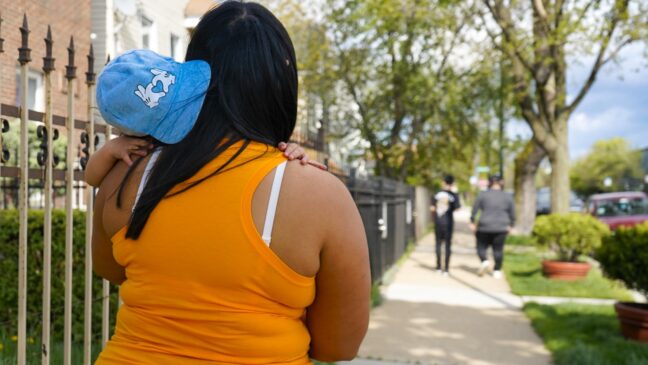
By Wendy Wei and Leslie Hurtado, April 29, 2024
While anti-migrant sentiments have been expressed by many Chicagoans of different backgrounds, much media focus has been on the Black community’s historical tension with Latinx communities. However, lifelong Black housing advocates say that the energy spent on anti-migrant protests could be more productively used if it was channeled toward addressing the root causes of housing instability in the city.
According to DePaul’s Institute for Housing Studies, in 2021, before the first bus arrived from Texas, the city was already short 120,000 affordable housing units to accommodate Chicago’s low-income renter households.
That same year, the Chicago Department of Family and Support Services counted 3,000 people in shelters, and 702 sheltering on the street (though this number could be as high as 1,500). 73 percent of this population was Black.
Street homelessness is only part of the picture. In 2021, the Chicago Coalition for the Homeless estimated that 68,440 people were experiencing homelessness in Chicago, with most temporarily staying with others, or “doubling up.” In their report, Black Chicagoans made up more than half of the total population experiencing homelessness.
Hendricks says that frustrations have been brewing since the 2008 Great Recession, and were worsened by the COVID-19 pandemic, during which Black Chicagoans faced severe disparities. Despite constituting about 30 percent of the city’s population, they accounted for 60 percent of its COVID-19 fatalities and a quarter of Illinois’ confirmed cases.
“Because poor people were under a lot of stress and pressure, when they see somebody getting a resource, and they know they’ve been denied some space, they blame those folks and they blame the people who are providing them with those resources. And it becomes a racial tension,” Washington said. “So that’s a misunderstanding of the real situation.We have two crises. A migrant crisis and a housing [crisis].”
Joan Esposito: CCH’s Law Project and the SCOTUS

Joan Esposito hears from Camilla Krauss, CCH Staff Attorney of the Law Project. Tune in at 1:41.
Chicago Defender: Legacy of Inequitable Housing Access–How a Black Family’s Story Echoes Today’s Fight
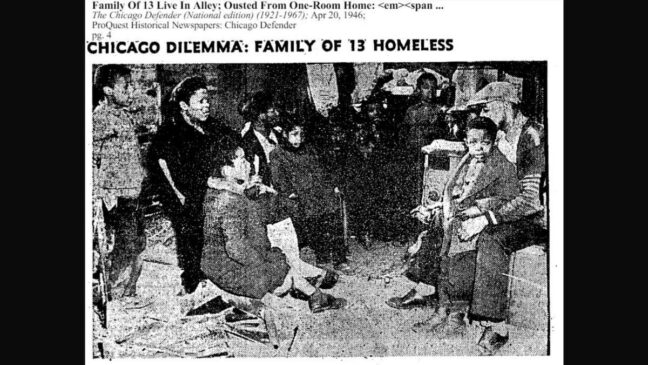
By Tacuma Roeback, Chicago Defender Managing Editor
Thanks to the efforts of Carl Hansberry and later the Dr. Martin Luther King Jr., James Bevel, and Al Raby-led Chicago Freedom Movement, the Fair Housing Act of 1968 was ratified, and restrictive covenants were outlawed. What Chicago’s unhoused population and those on the verge of losing their homes face today is similar to what the Hemmons family endured back in 1946. But politics and entrenched segregation by race and class do the work restrictive covenants once did.
Moreover, organizations that advocate for the homeless and affordable housing argue that Chicago residents recently had an opportunity to vote for a transfer tax known as Bring Chicago Home that would’ve helped to change the fortunes of thousands of unhoused persons and those on the verge of losing their homes.
Instead, the March 19 ballot measure was soundly defeated.
With that setback, a familiar theme prevailed, one that governed the lives of families like the Hemmons and thousands of others, especially those who were Black and poor.
“The powers that be have always pushed back on efforts to make access to housing more just because it undermines their profits and their power,” said Douglas Schenkelberg, executive director of the Chicago Coalition for the Homeless. “And so the loss of the referendum question (Bring Chicago Home) is yet another example of the status quo working to maintain the status quo.”
Bring Chicago Home sought to help two groups: people already unhoused and in need of shelter and those on the verge of losing their homes.
According to proponents, BCH would have incrementally raised the city’s real estate transfer tax on properties valued at more than $1 million. The transfer tax would have generated $100 million yearly for mental health services, job training and educational opportunities for the unhoused. Schenkelberg said BCH monies would have funded two large-scale solutions that would effectively address homelessness in the city.
For Schenkelberg and many who work on behalf of the unhoused in Chicago, the great dilemma is knowing that programs that can effectively address homelessness exist but that there isn’t a sustainable funding stream to address large-scale homelessness in the city.
“Are we investing funding at scale in these proven solutions that we can have a measurable impact on the problem?” Schenkelberg said.
As for the business and real estate interests that opposed BCH, Schenkelberg poses this challenge:
“You’ve said multiple times throughout the campaign and after election day that you think addressing homelessness is a very important issue, that it’s something we have to tackle in the city of Chicago,” he said.
“So how are you going to step up in a way that’s meaningful and has a measurable impact on the 68,000 people experiencing homelessness in Chicago? How will you show up differently than you’ve shown up before Bring Chicago Home?”
This time around, the fight still centers around BCH, which supporters contend is not dead.
They vow not to give up.
They believe they have a measure that could disrupt a persistent narrative and resolve a problem that has impacted Black people the most.
“There were 68,000 people experiencing homelessness before Election Day, and there are 68,000 people experiencing homelessness after it, so one election doesn’t change our course over the long term,” said Schenkelberg.
“The work goes on, and we only honor the people who have fought for this for years by continuing to do the work.”
Oral Arguments Begin in Johnson v. Grants Pass Case, Determining the Constitutionality of Criminalizing Homelessness
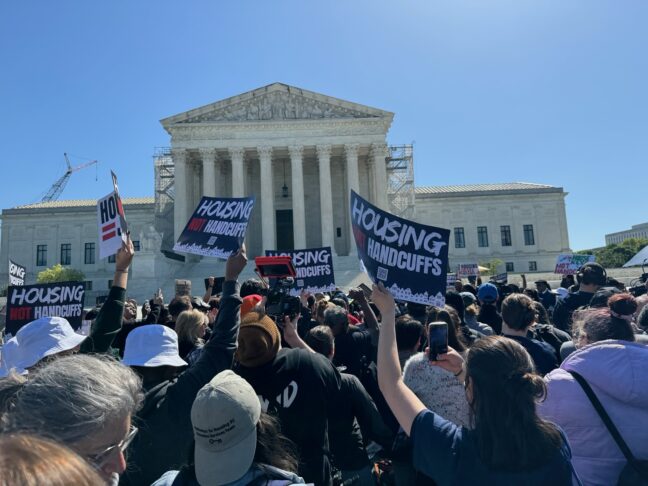
By Sam Paler-Ponce, interim associate director of policy
On Monday, April 22, 2024, the U.S. Supreme Court began oral arguments in Johnson v. Grants Pass, a case deciding if cities have the right to penalize people experiencing homelessness for sleeping outdoors.
Listen to the oral argument by clicking here.
The City of Grants Pass argues the city is just following the trend of most other cities, as many cities across the country are already arresting and fining people experiencing homelessness. However, Grants Pass has taken the most extreme posture: there is nowhere, at no time, where people living outside can sleep with things like a blanket or pillow.
Cruel and Unusual Punishment
At the heart of Johnson v. Grants Pass lies the interpretation of constitutional protections against cruel and unusual punishment. In 1962, the Supreme Court weighed in on a similar issue in the case of Robinson v. California. The case struck down a California law that made it a crime to “be addicted to the use of narcotics.”
The court held that the law may not criminalize someone’s status as a person with a substance use disorder and must instead target some kind of criminal act. Therefore, a state may punish a person for the illegal purchase, sale, or possession of narcotics, and—absent any evidence of illegal drug use— the state of California could not punish someone simply for existing with a substance use disorder.
Martin v. Boise
The 2018 case of Martin v. Boise challenged the city of Boise’s enforcement of camping and disorderly conduct ordinances against persons experiencing homelessness—those who need to sleep in public in the absence of adequate housing or shelter.
Now six years ago, the U.S. Supreme Court denied a petition by the city of Boise to review the case Martin v. Boise (formerly Bell v. Boise). This leaves in place earlier rulings under the U.S. Court of Appeals for the Ninth Circuit, which held that people experiencing street homelessness could no longer be arrested simply because they are homeless.
Dozens of court cases have since cited Martin v. Boise, including courts in Florida, Missouri, New York, Ohio, Texas, and Virginia.
Criminalizing Homelessness
As the U.S. Supreme Court prepares to deliberate on this landmark case, the outcome holds significant implications for the quarter of a million people nationwide who find themselves without shelter on any given night. While the case of Johnson v. Grants Pass serves as a focal point for legal debate, it also highlights the systemic failures that perpetuate homelessness nationwide.
In Grants Pass, people are issued $295 tickets for using a blanket to stay warm when they have nowhere else to go. Punitive measures like incarceration and fines exacerbate the issue, rather than resolve it. The real solution lies in ensuring safe, decent, and affordable housing.
Local Insight
Over 1,000 organizations and public leaders across the country have filed more than 40 amicus briefs (“amici”) in support of Gloria Johnson and homeless rights in the landmark case.
An amicus brief is submitted by a person or group not directly involved in a legal case but is permitted to support the court by providing information, expertise, or insight relevant to the case. These briefs, known as “amici,” aim to inform the court about potential public policy consequences of a ruling.
Chicago Coalition for the Homeless, alongside 27 partner organizations, filed an amicus brief, raising the importance of the case and the impact on people experiencing homelessness in Chicago and Illinois.
The U.S. Supreme Court is expected to take a position by June 2024.
View the transcript of the argument by clicking here.
Chicago Tribune: Chicago to have one unified shelter structure for homeless and migrants, city and state officials say
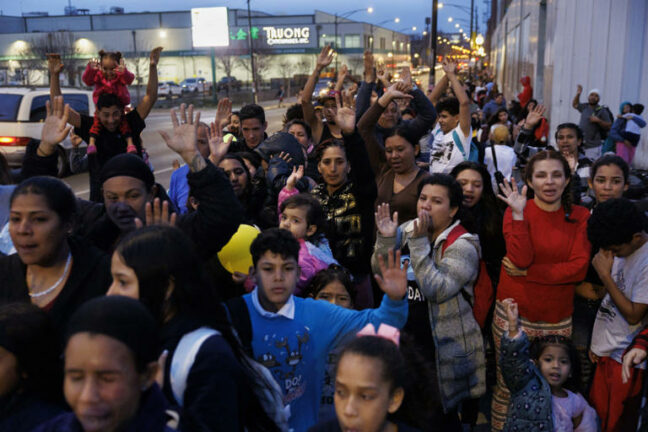
By Nell Salzman, April 22
The city and state are in the planning stages to combine Chicago’s legacy homeless shelter system with its system for migrants, according to government officials, and turn it into a unified shelter structure, an idea advocates for the homeless have long championed.
Sam Paler-Ponce, interim associate director of policy for the Chicago Coalition for the Homeless, said combining the systems is a “move in the right direction.” The biggest benefit, he said, is that asylum-seekers will have a wider array of supportive services made available to them: employment, food and health care.
But combining the systems could also lead to an “influx in shelter bed demand,” he said.
According to recent data from the organization, there are more than 68,000 people currently experiencing homelessness in Chicago. Nearly 37,000 people accessed homeless services throughout the year. These figures don’t include migrants.
WBEZ: A U.S. Supreme Court case could affect homeless people in Chicago and Illinois
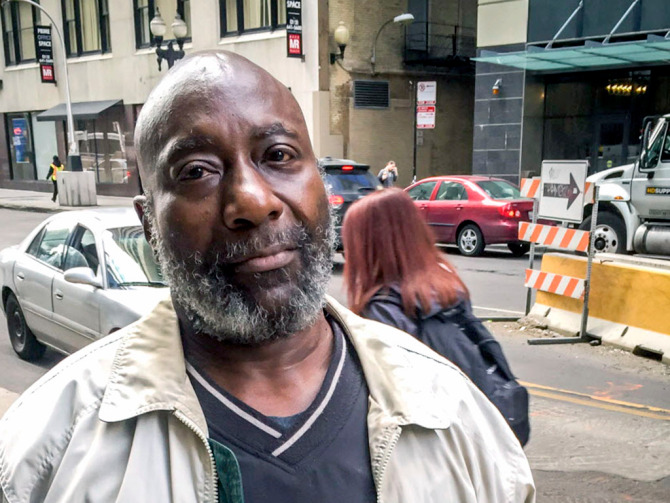
By Esther Yoon-Ji Kang, April 11, 2024
In 2015, Robert Henderson returned from panhandling to the viaduct under which he was sleeping on Chicago’s West Side. He was unhoused at the time.
“When I came back, I saw a blue garbage truck,” recalled Henderson, now 70. “When I finally looked around, everything that I owned at that particular time was thrown in the garbage truck.”
His belongings included blood pressure medicine, his Social Security and Medicaid cards, a copy of his birth certificate, family photos and clippings of loved ones’ obituaries.
With help from the Chicago Coalition for the Homeless, Henderson sued and settled a case against the city of Chicago on the grounds that tossing his belongings violated Illinois’ Homeless Bill of Rights, enacted in 2013.
Now, Henderson, who has lived in a Chicago Housing Authority apartment for the past seven years, is using his experience to speak out against a high-profile case on the U.S. Supreme Court docket.
Logan Center: Many of the city’s homeless are not on the streets on a rainy winter night
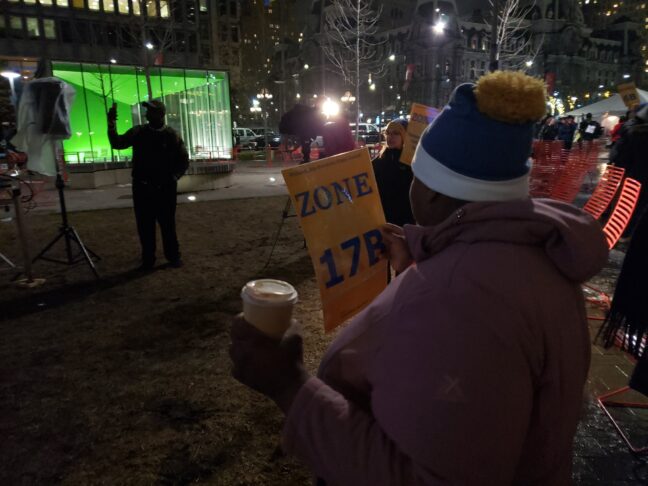
By Allison Beck and Julius Philp, April 9, 2024
Multiple studies in cities across the country, including New York City, Chicago and Houston, have shown that not only does the PIT count miss people that it is intended to capture, but it excludes those living in their cars or abandoned buildings and those in temporary living situations like motels and doubling up.
Doubling up is one of the most common ways that people experience homelessness. It happens when a person or group of people are unable to afford their own housing and are forced to live with others, often leading to overcrowding. It’s also one of the experiences of homelessness that isn’t considered in the point in time count, which is why researchers from the Chicago Coalition for the Homeless and Vanderbilt University created a way to measure it using publicly available data.
“We’ve seen doubled up homelessness is starting to be funded alongside street and shelter homelessness,” said Sam Paler-Ponce, the interim associate director of city policy at the Chicago Coalition for the Homeless. “I don’t think that would have been as possible without a measure to describe the total scope.”

